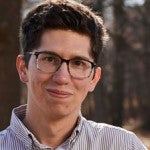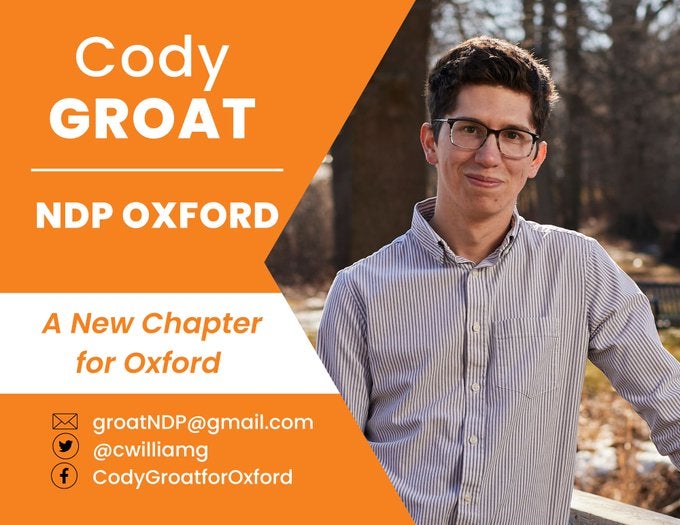
“I think that my role as a university professor makes me well-suited for service as a parliamentarian, as a lot of the skills are transferrable,” explains Cody Groat. “I've long been interested in politics at a local, regional, and national level.” Cody Groat is a History PhD candidate at Wilfrid Laurier University and hopes to defend his dissertation this summer. He is also Assistant Professor in History and Indigenous Studies at Western University, appointed to that role in July 2021.
Cody’s research, under the supervision of Dr. Susan Neylan, looks “at the commemoration of Indigenous history by the Historic Sites and Monuments Board of Canada, a body that advises the federal government, since its inception in 1919.”
Taking time out of his busy schedule, Cody kindly answered a few questions about his decision to seek the nomination as New Democratic Party (NDP) Candidate for Oxford, a riding which includes Oxford County and a little of Brant County in southern Ontario. Since the resignation of the Oxford Member of Parliament (MP) at the end of January 2023 an opening in Cody’s home riding was created. The Prime Minister will call a federal by-election within six months to fill the vacancy.
Tri-U: Can you give us an idea of the process of nomination?
Cody: There is one other person seeking the NDP nomination [in Oxford]. The person on the ballot will be determined by local party members, and the deadline to purchase a membership was March 3. The vote to determine the candidate will take place April 17. The by-election will likely take place this summer. I do not believe that it will be looped into a general election, but it will be held simultaneously with three other by-elections. The one in Oxford will be the only one in Ontario.
Tri-U: Do you see your research and teaching connect to public service? How?
As historians, we are asked to consider a theme, issue, or event from a number of perspectives, while being able to substantiate our beliefs with appropriate evidence. This can be compared with the consideration of legislation and the response that this might receive from those who represent other parties or constituencies. My work as a Canadian historian has also provided me with a foundation for understanding the trajectory of our communities over time, giving me insight into the issues that continue to impact us.
Tri-U: You grew up in Oxford where you are running. Explain your relationship with your home area. What are you most passionate about when you think of the issues related to your home community?
Cody: I moved to Oxford County when I was seven years old. I first lived in the Adam Oliver Housing Cooperative in Ingersoll and then we later lived on farms in Foldens and Mt. Elgin before returning to Ingersoll.
One of the most pressing issues facing our community is services to support those who are transitioning into retirement, including services associated with long-term care. We often hear conversations about jurisdictional divides between federal, provincial, and municipal governments, but I feel that collaboration among the three levels of government is the best approach moving forward.
Oxford is also a community that has deep roots in agriculture and automotive production, and I think that both industries are at a turning point. We have the opportunity to be at the forefront, nationally, in developing strategies for agriculture that recognize the impacts of the climate crisis and can further be international leaders in the production of energy efficient vehicles.
Tri-U: Explain Indigenous relationships in your community. You recently tweeted out an invitation you had to talk about the Truth and Reconciliation Commission’s Calls to Action at the municipal level with your local town, Ingersoll. What are you interested to share with your community at that level?

Cody: I'm a band member of Six Nations of the Grand River and one of many thousands of urban Indigenous peoples who reside across Canada. Often, in a community such as Oxford County that is not immediately adjacent to a reserve, there can be a habit of thinking that Indigenous issues are not directly associated with the ways that we govern ourselves. If elected, I would continue to advocate for the changes that are called for in the Final Report of the Truth and Reconciliation Commission, the National Inquiry Into Missing and Murdered Indigenous Women and Girls and assure that we are meeting expectations that are identified in the United Nations Declaration on the Rights of Indigenous Peoples. As someone who has grown up in Ingersoll, I'm thankful that Mayor Brian Petrie requested I speak to the Town of Ingersoll regarding the Calls to Action in the TRC that directly relate to municipal governments. While I often stress that these have been issued for eight years, since 2015, I think that this is a meaningful step forward.
Tri-U: Do you have other community involvements you would like to share?
Cody: I currently serve on the joint Board of Directors for Alexandra Hospital Ingersoll and Tillsonburg District Memorial Hospital. I am also on the Board of Directors for Stevenson Children's Camp in Dorchester and the Board of Directors for the Ontario Museum of Archaeology. I also chair the Canadian Commission for UNESCO Memory of the World Advisory Committee.
Image from Cody Groat Twitter Post February 21, 2023